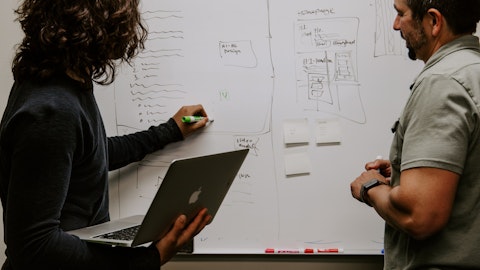Steve Howden: Brett, I’ll just add, I’ll just add, I mean, keep in mind, we think about just one bucket of that question, which is the CapEx that we spend each year. And whilst we’re not getting into guidance for 2024 at this point in time, just remember that in the last couple of years, we’ll have spent, in excess of $600 million per year on a variety of projects, growth oriented, towers, fibre, Project Green. And some of those things will have a different flavour next year. Project Green, as we know, was a heavy spend in 2022 and 2023, and will be a much lighter spend in 2024, purely because of the programme that we’ve announced publicly. And likewise, with towers and fibre, we’re really thinking about the trade-off of growth versus cash generation and cash preservation within the business such that, we’re making the right decisions and, again, at some step trying to generate maximum value for shales.
Brett Feldman: Thank you.
Operator: Your next question comes from the line of Michael Rollins from Citi. Your line is open.
Michael Rollins: Thanks, and good morning. Two questions, if I could. The first is, you mentioned in reference that you have low churn in the business. I was just curious if you could articulate what those churn rates look like for the company, as well as for any of the key geographic regions. And then secondly, just taking a step back, I’m just curious if you can remind us of where you have common ground with MTN and Wendel, and where there are differences in perspective, and if any of those differences have evolved, changed over the last few months, as we’re just trying to appreciate the — kind of the background to the situation. Thank you.
Sam Darwish: Mike, so on the first one on churn, as you know, we don’t include that in our revenue growth which is not selling fast, because it’s quite small. Something that, we’ve been discussing with you and others for a while. In the quarter that has gone, it was 70. So, across a base of 60,000 tenants, our churn was 70. In prior quarters, sometimes it’s 100, sometimes 150, sometimes it’s next to zero. So, the churn rates over a blended period of time, there’s a sort of 1%, maybe even sub 1%. And then when you look at also who those tenants are, that churn tends to be on what we call the non-key customers. We define key customers in our disclosure material as the top tier of customers who represent, north of 92, 93% of our revenue base. And actually, the majority of the churn that we do see, albeit small, comes out of the non-key customers.
Steve Howden: On the second question, Mike, and again, I’ve spoken about that a few minutes ago. So, our shareholders, in particular, our three ICO shareholders, Wendel and MTN, have been vocal about the governance requirements, which on this side, we perceive more as efforts to change the balance of influence between them and us and the post-ICO shareholders. And given that one of them, in particular, is a client, is actually a large client, this adds a substantial complexity to the situation. So, their demands, their requirements are clear. It’s a complex discussion, and we will report, Mike, as and when appropriate.
Michael Rollins: If I could just follow up with one more. In the past, even on this call, you referenced different actions that the company’s trying to take to improve shareholder value. Is there a higher level set of goals or principles that you want to bring into the company to continue to create forward progress on that goal to improve shareholder value? Is there anything that you’ve been able to simplify or determine as the best course, if you do one, two, three things, that this can have the best results for shareholders?
Steve Howden: Mike, I’ll maybe have a go at that. We’ve spoken on this call and previously around resolving the matters with MTN and Wendel on the shareholder side. We’re very cognizant of that. And we’ve also been a bit more forthcoming on this call around how we’re going to look at CapEx and the organic side of capital deployments. And so you’re starting to see some things come through that we’ll continue to add into overtime in recognition of where we are as a business within our markets, also within the globe, within the world in terms of the macroeconomic situation that everybody is facing. And so those are just a couple of the initial elements of thinking that you’re starting to see and hear more of. And we’re looking forward to pushing those couple of initiatives forward.
And then as we continue progressing, as Sam said a few moments ago, as a company, as a board, we’re constantly thinking. No one’s happy with how the company is valued today. We’re constantly thinking about ways that we can look to improve on that. And we’ll communicate on those as and when they become announceable.
Sam Darwish: Don’t forget, we have multiple issues we’re dealing with. We have the global macro situation, which is not conducive. We have a concentration in Nigeria, which we’re trying to kind of like solve for or diversify of. We have a relatively some elevated client concentration, which also needs to be addressed. We have, in addition to all of these, we have a daily trading situation, which I’m happy to say that has improved. As I said earlier, our daily trading volumes have tripled, almost tripled, over the past period. So moving in the right direction. But there are multiple issues that we need to deal with. And we are trying to deal with each of it in a different way. In terms of the trading, for example, we have recently removed all lockups on all shareholders.




